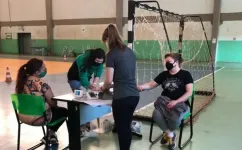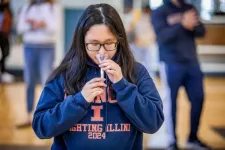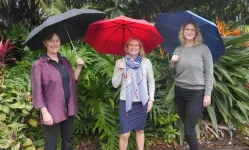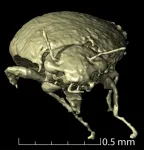(Press-News.org) In a study involving 34 women aged 50-70, researchers at the University of São Paulo (USP) in Brazil performed objective measurements of the impact on the subjects' health of the decrease in physical activity observed during the period of social distancing and isolation imposed by COVID-19. Tests conducted after the first 16 weeks of confinement pointed to a deterioration in their overall health, including loss of muscle strength and diminished aerobic capacity, as well as elevated levels of cholesterol and glycated hemoglobin, both of which are risk factors for metabolic disorders.
The study was supported by São Paulo Research Foundation - FAPESP
and reported in an article published
in the journal Experimental Gerontology.
"It's important to stress that these women were already considered physically inactive before the pandemic, in the sense that they didn't exercise regularly. With confinement, they became even more sedentary, abandoning such activities as walking the dog, going shopping, playing with grandchildren, walking to the bus stop, or walking to work," Carlos Bueno Junior, last author of the article, told. Bueno Junior is a professor at the University of São Paulo's Ribeirão Preto School of Physical Education and Sports (EEFERP-USP).
Designed before the pandemic in partnership with Ellen de Freitas, another professor at EEFERP-USP, the study originally set out to analyze the effects of different physical training programs on groups of volunteers with varying profiles.
A first set of examinations and tests took place in February 2020, before the start of the study proper, to record weight, body mass index (BMI), fat mass, waist circumference, blood pressure, handgrip strength (measured with a dynamometer), and diet (via a questionnaire). The women were also asked to do a test known as the six-minute walk to measure their cardiovascular capacity. Finally, blood samples were collected to analyze white and red blood cell count, cholesterol, glycemia, insulin and glycated hemoglobin (risk factors for type 2 diabetes).
"The plan was to repeat all the exams after they completed the exercise protocol, but the pandemic prevented this. Instead, we adapted the project to evaluate the health impact of the social changes caused by COVID-19, especially in older people. We already had the baseline measurements. We redid the tests after the first 16 weeks of confinement, following all the protocols to avoid contagion," Bueno Junior said.
Master's candidates João Ribeiro de Lima and Gabriela Abud collaborated in the study, and are the first and second authors of the article.
Results
The second battery of tests showed no changes in weight, BMI, fat mass, or waist circumference. However, on average there was a rise of 39.8% in levels of insulin and an increase of 9.7% in glycated hemoglobin. Blood sugar rose 1.3%, but this was not considered significant.
Total cholesterol rose 8%. Blood platelets fell 10%, a change considered significant: the causes and implications of this phenomenon are being investigated.
The grip test showed a 5.6% drop in muscle strength. The six-minute walk test showed a 4.4% loss of aerobic capacity.
"Some of these parameters, such as muscle strength and aerobic capacity, were already below the ideal for this age group because of the volunteers' lifestyle," Lima said. "The study showed that in the context of the pandemic something that was bad became even worse. The risk of chronic disease increased, and existing cardiovascular or metabolic problems worsened."
According to Abud, the answers to the questionnaire showed that diet did not deteriorate during the period, so the adverse effect on health observed in the study had to be due mainly to the decrease in physical exercise. "Many of these women had jobs and a hectic routine before the pandemic, even though they didn't practice sports or get regular exercise," she said. "Some reported feeling more stressful owing to confinement, and this may also have contributed to the overall deterioration in their health."
The researchers believe the findings should serve as a warning to government and society in general. "In a period of only 16 weeks, there were significant changes in some of the parameters, and the prolonging of the public health crisis tends to make the implications for the health of sedentary older people even more severe. We need to think about ways of promoting physical activity safely during this period," Lima said.
For Bueno Junior, getting exercise during periods of social distancing or isolation is vitally important not only to physical but also to mental health. "One possibility is exercising at home with the aid of virtual platforms," he said. "For older people or anyone with physical limitations, however, it's important to have some kind of personalized professional guidance while training, because the risk is greater."
According to Lima, the results of the study show that besides the time dedicated to exercise and training, what people do during the rest of the day is also significant and should be evaluated. "Many believe that just because they work out in the gym for an hour they're free to eat whatever they like or remain seated for the rest of their free time watching TV," he said. "That's not really the case, however. It's vital to reduce the time spent sitting or lying down."
INFORMATION:
About São Paulo Research Foundation (FAPESP)
The São Paulo Research Foundation (FAPESP) is a public institution with the mission of supporting scientific research in all fields of knowledge by awarding scholarships, fellowships and grants to investigators linked with higher education and research institutions in the State of São Paulo, Brazil. FAPESP is aware that the very best research can only be done by working with the best researchers internationally. Therefore, it has established partnerships with funding agencies, higher education, private companies, and research organizations in other countries known for the quality of their research and has been encouraging scientists funded by its grants to further develop their international collaboration. You can learn more about FAPESP at http://www.fapesp.br/en and visit FAPESP news agency at http://www.agencia.fapesp.br/en to keep updated with the latest scientific breakthroughs FAPESP helps achieve through its many programs, awards and research centers. You may also subscribe to FAPESP news agency at http://agencia.fapesp.br/subscribe.
When it comes to understanding and predicting trends in energy use, the internet is a tough nut to crack. So say energy researchers Eric Masanet, of UC Santa Barbara, and Jonathan Koomey, of Koomey Analytics. The two just published a peer-reviewed commentary in the journal Joule discussing the pitfalls that plague estimates of the internet's energy and carbon impacts.
The paper describes how these errors can lead well-intentioned studies to predict massive energy growth in the information technology (IT) sector, which often doesn't materialize. "We're not saying the energy use of the internet isn't a ...
CHAMPAIGN, Ill. -- The chance of detecting the virus that causes COVID-19 increases with more frequent testing, no matter the type of test, a new study found. Both polymerase chain reaction and antigen tests, paired with rapid results reporting, can achieve 98% sensitivity if deployed at least every three days.
"This study shows that frequent testing can be really effective at catching COVID-19 infections and potentially blocking transmission," said study leader Christopher Brooke, a virologist and professor of microbiology at the University of Illinois Urbana-Champaign. "There are many places where vaccination is not yet widespread. With the rise of variants, testing remains an important tool ...
QUT researchers have developed a new machine learning mathematical system that helps to identify and detect changes in biodiversity, including land clearing, when satellite imagery is obstructed by clouds.
Using statistical methods to quantify uncertainty, the research, published in Remote Sensing in Ecology and Conservation, analysed available satellite images of an 180km square area in central south-east Queensland.
The region is home to many native species including the critically endangered northern hairy-nosed wombat and the vulnerable greater glider, and the ...
Fossilized feces are common finds at paleontological dig sites and might actually contain hidden treasures. By scanning fossilized dung assigned to a close dinosaur relative from the Triassic period, scientists discovered a 230-million-year-old beetle species, representing a new family of beetles, previously unknown to science. The beetles were preserved in a 3D state with their legs and antennae fully intact. The finding appears June 30 in the journal Current Biology.
The discovery that fossilized droppings, also known as coprolites, can preserve ancient insect species offers a new alternative to amber fossils--fossilized tree resin, which normally yield the best-preserved insect fossils. The oldest ...
Don't let the great snipe's pudginess fool you. A stocky marsh bird with a 20-inch wingspan, great snipes are also speedy marathoners that can migrate from Sweden to Central Africa in just three days, without even stopping to eat, drink, or sleep. Now, researchers find that the snipes also rise nearly 2,500 meters in elevation at dawn and descend again at dusk each day, perhaps to avoid overheating from daytime solar radiation by climbing to higher, cooler altitudes. The findings appear June 30 in the journal Current Biology.
The birds also spent much more time in higher elevations ...
Election outcomes are notoriously difficult to predict. In 2016, for example, most polls suggested that Hillary Clinton would win the presidency, but Donald Trump defeated her. Researchers cite multiple explanations for the unreliability in election forecasts -- some voters are difficult to reach, and some may wish to remain hidden. Among those who do respond to surveys, some may change their minds after being polled, while others may be embarrassed or afraid to report their true intentions.
In a new perspective piece for END ...
30 June 2021: A large cohort study drawn from the national IVF registry of France, which included almost 70,000 pregnancies delivered after 22 weeks gestation between 2013 and 2018, has found a higher risk of pre-eclampsia and hypertension in pregnancies derived from frozen-thawed embryos. This risk was found significantly greater in those treatments in which the uterus was prepared for implantation with hormone replacement therapies. The results confirm with real-life data what has been observed in sub-groups of patients in other studies.
The results are presented today by Dr Sylvie Epelboin from the Hôpital Bichat-Claude Bernard, Paris, at the online annual meeting of ESHRE. The study was performed on behalf ...
The tiny beetle Triamyxa coprolithica is the first-ever insect to be described from fossil faeces. The animal the researchers have to thank for the excellent preservation was probably the dinosaur ancestor Silesaurus opolensis, which 230 million years ago ingested the small beetle in large numbers.
In a recently published study in Current Biology, vertebrate palaeontologists from Uppsala University and entomologists from National Sun Yat-sen University (Taiwan), Friedrich-Schiller-Universität Jena (Germany), and Universidad de Guadalajara (Mexico) used synchrotron microtomography to 3D-reconstruct the beetles while they were still trapped within the fossilised faecal matter. The coprolite contained abundant beetle body parts, most belonging to ...
Harpy eagles (Harpia harpyja) - which are among the world's largest eagle species - struggle to feed offspring in heavily deforested areas of the Amazon, according to a study published in Scientific Reports.
Everton Miranda and colleagues found that harpy eagles rely on specific prey that lives in canopy forests, including sloths and monkeys. Eaglets starved in areas of high deforestation where canopy-based food was limited.
The authors observed prey species, how frequently prey was delivered, and estimated the weight of prey in 16 harpy eagle nests in Amazonian forests in Mato ...
ROCKVILLE, MD, USA - June 30, 2021 - Researchers from Sanaria® Inc. and the National Institutes of Health (NIH) are making progress in the development of highly protective malaria vaccines.
In an article published today in Nature, Sanaria's PfSPZ-CVac (CQ) vaccine is reported as being safe and protecting 100% of six subjects against a variant malaria parasite three months after their last dose in the company's Phase 1 safety and efficacy trial. This is the first time complete protection against a variant malaria parasite has ever been achieved that long after vaccine administration.
The ...




